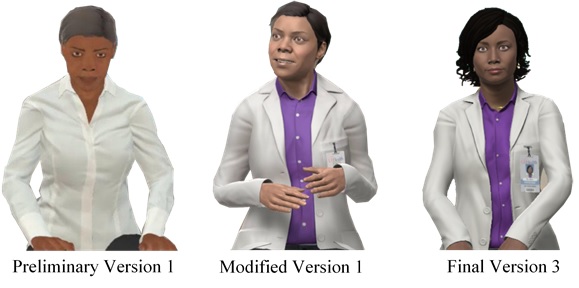A Digital Intervention Promoting Colorectal Cancer Screening for Black Women
AI Health and Science
Despite efforts to improve colorectal cancer (CRC) screening with a goal of reducing mortality and health outcome disparities, CRC is the third-leading cause of cancer deaths among Black women in the United States.
In the interest of increasing early detection of CRC for Black women, University of Florida College of Journalism and Communications STEM Translational Communication Center scholars and colleagues wanted to explore alternative approaches to communicating screening options. The research team studied participant responses to a virtual health assistant (VHA)-delivered intervention promoting CRC screening with an at-home stool test.
VHAs consisting of computer-generated characters have been effective with other disease interventions in reducing patients’ feelings of stigma as well as the fear of being negatively judged by healthcare providers. The researchers suggested that by reducing such stigma and fear, more patients may be willing to receive and act on information for CRC home-screening options in support of their health.
The team investigated what cues are important in a VHA-delivered intervention, and how those cues interact to shape credibility of the intervention promoting CRC screening among Black women.
 Key findings suggest that VHAs provide a systematic way to deliver health information on CRC. Cues such as friendliness, clothing, and consistency align with heuristics such as trust, expertise, and content to be effective in reducing screening barriers for Black women. Put simply, representation matters.
Key findings suggest that VHAs provide a systematic way to deliver health information on CRC. Cues such as friendliness, clothing, and consistency align with heuristics such as trust, expertise, and content to be effective in reducing screening barriers for Black women. Put simply, representation matters.
Existing heuristics of medical expertise, such as preferences for the VHA to wear a white lab coat and present as a middle-aged doctor, may have shaped expectations as well.
As for limitations, because this study focuses on Black women, findings may not be transferrable to other populations. Additionally, study participants were exclusively from the southeast United States, and there may be regional differences in how people value different cues. Future studies should build on these findings to hypothesize and test causal sequences between cues, heuristics, and credibility of behavior-change messages.
The original research paper, “Tailoring Virtual Human-Delivered Interventions: A Digital Intervention Promoting Colorectal Cancer Screening for Black Women,” appeared in Psycho-Oncology, on Sept. 6, 2020.
Authors: Melissa J. Vilaro, STEM Translational Communication Center, College of Journalism and Communications, University of Florida; Danyell S. Wilson-Howard, Bethune-Cookman University; Lauren N. Griffin, STEM Translational Communication Center, College of Journalism and Communications, University of Florida; Fatemeh Tavassoli, Computer & Information Science & Engineering, College of Engineering, University of Florida; Mohan S. Zalake, Computer & Information Science & Engineering, College of Engineering, University of Florida; Ben C. Lok, Computer & Information Science & Engineering, College of Engineering, University of Florida; Francois P. Modave, Health Outcomes & Biomedical Informatics, College of Medicine, University of Florida; Thomas J. George, Hematology & Oncology, College of Medicine, University of Florida; Peter J. Carek, Community Health & Family Medicine, College of Medicine, University of Florida; Janice L. Krieger STEM Translational Communication Center, College of Journalism and Communications, University of Florida.
This summary was written by Marie Morganelli, Ph.D.
Posted: October 7, 2020
Insights Categories:
AI, Health and Science
Tagged as: AIatUF, Colorectal Cancer, Janice Krieger, Melissa Vilaro, Virtual Human Assistants


